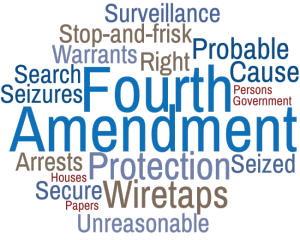Must you choose between your 2nd & 4th Amendment rights? Retweet
A police car pulls behind you, the lights go on, and you get that sinking feeling in your stomach. Your heart starts to race. You even start to shake a little, as you pull to the side. 
Quick, what do you need to know? What are your rights in this exchange? Why is he even pulling you over? And what if you have a concealed handgun in the car? Will the officer be “on edge?”
We have a traffic stop case at the intersection of the Second and Fourth Amendments (and even the Fifth). We want to submit an amicus brief to the U.S. Supreme Court.
We want the Justices to take up the case of United States v. Robinson and to address the following question…
Do you give up your Fourth Amendment rights to be free of an unwarranted search, for merely having a weapon in your car?
…because the U.S. Court of Appeals, really messed up the answer to this question.
- The Fourth Circuit has ruled that everyone stopped for a traffic violation is now endangered — especially persons with concealed carry weapons licenses (CCWs).
- And if we don’t nip this in the bud, every law-abiding person could be in danger of having the police “draw down” on them during a traffic stop.
The Case
A caller reported that a black man (Robinson) in a 7-11 parking lot had loaded a gun and put it in his pocket. Police tailed the car, in which Robinson was a passenger. They pulled it over, using the pretext that the occupants weren’t wearing seat belts. But before writing any tickets…
They asked Robinson if he had a weapon. Robinson didn’t verbally respond, as was his right. Based on “the look on his face” they pulled him out of the car and conducted a “frisk” — a search.
They found a gun, as result of the search. Robinson was charged with felony possession.
We maintain that this search was a violation of his Fourth Amendment rights.
Robinson moved to suppress the evidence (the gun) on the ground that, even though the police had probable cause to stop the car and write a ticket, they had no reasonable suspicion to frisk him simply because he might be armed.
The Erroneous Fourth Circuit
In Terry v. Ohio, the Supreme Court said that for the police to frisk someone they must believe that he is BOTH armed AND dangerous.
The lower courts, however, have conflated these two (ignored the conjunction), assuming that anyone who is armed is necessarily dangerous. Thus, they can be searched and disarmed.
And so we ask, again…
Do you give up your Fourth Amendment rights to be free of an unwarranted search, for merely having a weapon in your car?
One of the Fourth Circuit judges, who sided with the majority, wrote a concurring but dangerously odd opinion.
- He didn’t agree that any “weapon” in the car was sufficient grounds to crush Fourth Amendment rights. After all, anything, even a pencil can be turned into a weapon. But before you get excited…
- He reasoned, instead, that the ruling should only apply to firearms, but that it didn’t go far enough — hard enough at gun owners — for his tastes. He claimed that the mere presence of a firearm, in a police interaction, should always be treated as dangerous. Officers should use force to ensure against a speculative threat – frisk vehicle occupants, handcuff them, take the gun, etc.
Our Argument
We argue that treating everyone like a dangerous criminal, on a simple roadside stop, can turn ugly in a hurry. Ask Philandro Castile. Four seconds after disclosing he had a permitted firearm, Castile found five shots being pumped into his soon-to-be-lifeless body by a skittish police officer.
Our brief also presents some important facts…
- Concealed carry weapon licensees (CCWs) are far more law abiding than not only the average citizen but also the average cop!
- CCWs are seven times less likely to commit a crime than a police officer is.
In addition, our brief combats a pernicious violation of the Fifth Amendment text…
- Remaining silent during police interrogation does not mean a person is dangerous.
- Indeed, only twelve states presently require the CCW to disclose the presence of a handgun.
We need your help to pay for this brief. In this particular case, we’re partnering with Gun Owners of America and other organizations.
Please consider making a donation of $1,000.
Most people cannot afford that. Please know that when many people respond, contributions of various sizes, from small to large, add up to a lot.
And we were able to make this leap, to get this brief out before asking you, because of our wonderful monthly pledgers. Consider joining them. The more pledgers we have, the more aggressive we can be in our mission.
DownsizeDC.org is partnering with the Downsize DC Foundation, home of the Zero Aggression Project. When you click this link, you’ll be taken to the ZAP form. That way, your contribution can be tax-deductible, if you itemize.
We’ll send an email copy of the brief to everyone who gives.
Jim Babka & Perry Willis
DownsizeDC.org, Inc.
& Downsize DC Foundation (Zero Aggression)


